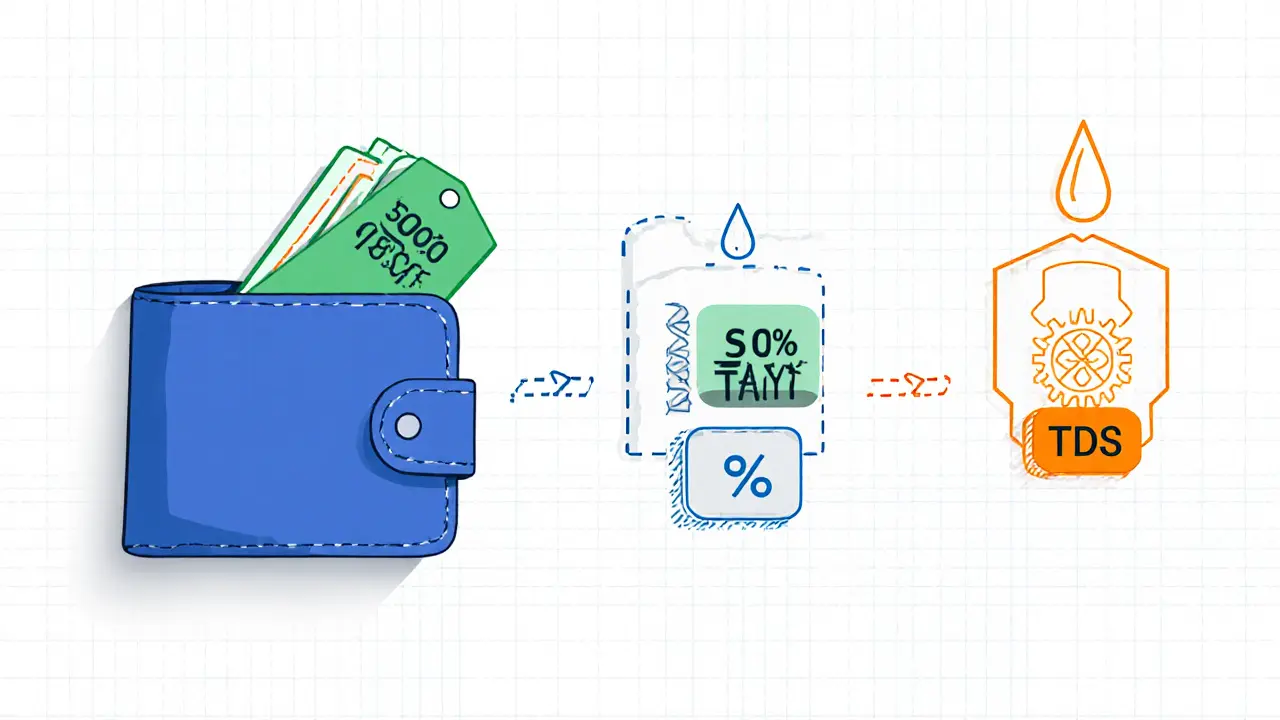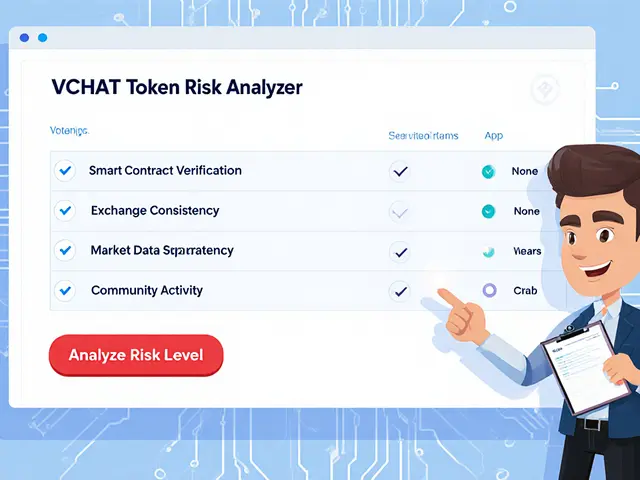NRI Crypto Tax Calculator
Tax Details
Flat 30% tax rate applies to all crypto capital gains for NRIs.
Only purchase cost is deductible; transaction fees, storage, and other expenses cannot be offset.
1% TDS is deducted on sales exceeding ₹50,000 (or ₹10,000 in some cases).
Your Tax Calculation
Are you an Indian citizen living abroad and wondering how your crypto earnings will be taxed back home? The short answer: there are no crypto tax exemptions for NRIs, and the flat 30% rate applies just like it does for residents. Still, the rules are full of nuances-residency status, source of income, and recent amendments can change what you owe. This guide walks you through the current Indian crypto tax framework, highlights where (if anywhere) you can claim relief, and gives practical steps to stay compliant.
Quick Takeaways
- All crypto capital gains for NRIs are taxed at a flat 30% rate, regardless of holding period.
- Only the purchase price is deductible; transaction fees, storage costs, and other expenses cannot be offset.
- Crypto received as mining rewards, gifts, or airdrops is taxed at regular income‑tax slabs, not the flat 30%.
- Section115F long‑term capital‑gain exemptions do NOT apply to crypto.
- Residency rule changes effective April2026 can shift global crypto gains into Indian tax jurisdiction if you spend 120days or more in India and earn over ₹15lakhs.
1. The Indian Crypto Tax Landscape
In 2022 India introduced a dedicated tax regime for Virtual Digital Assets (a term that covers cryptocurrencies, NFTs and tokenized assets). The framework was refreshed in April2025, but the core rules stayed the same:
- Capital gains from the sale of any VDA are taxed at a flat 30%.
- No distinction between short‑term and long‑term gains.
- Only the cost of acquiring the asset can be deducted.
- A 1% Tax Deducted at Source (TDS) under Section 194S kicks in when a single sale exceeds ₹50,000 (or sometimes ₹10,000). Exchanges must remit this TDS to the government.
The law treats crypto the same for residents and non‑residents, but your residency status decides whether global gains are in scope.
2. How NRIs Are Taxed
A Non‑Resident Indian (NRI) (an Indian citizen who does not meet the Indian residency criteria for tax purposes) is taxed only on income that is deemed to arise in India. For crypto, the definition of “Indian source” is still fuzzy, but two practical points emerge:
- If you trade on an Indian exchange, the income is considered Indian‑sourced and therefore taxable.
- Trades on foreign platforms are generally viewed as foreign‑sourced, and an NRI would not owe Indian tax unless the new residency rule pulls you into resident status.
When crypto is acquired without purchase consideration-such as mining, airdrops, or gifts-the amount is treated as ordinary income. That income is then taxed at your applicable slab rate (5%‑30% depending on total earnings), which can be higher or lower than the flat 30%.

3. Exemptions and Benefits: What’s Available?
Unlike traditional investments (e.g., foreign‑exchange assets, Indian bonds, or mutual funds), crypto does not enjoy any specific relief under Section 115F. That provision lets NRIs exempt long‑term gains if they reinvest proceeds into approved instruments, but crypto is explicitly excluded.
In short, the NRI tax landscape offers:
- No exemption for capital gains on crypto.
- No loss‑set‑off against other income or other crypto gains.
- Only the 1% TDS credit, which you can claim while filing your return.
Thus, the only “benefit” is the certainty of a uniform 30% rate-no need to track holding periods.
4. Residency Rules That Can Change Everything
Starting April2026, India will replace the old 182‑day test with a 120‑day rule. If you spend 120days or more in India and your Indian‑source income exceeds ₹15lakhs, you become a resident for tax purposes. This shift means:
- All global crypto gains-whether earned on foreign exchanges or through overseas mining-will be taxable in India.
- You lose the limited NRI shield and must report worldwide crypto activity.
Even if you remain an NRI, the Resident but Not Ordinarily Resident (RNOR) (a transitional tax status for returning NRIs) faces similar source‑based taxation. The lack of clear guidance on decentralized transactions adds a layer of legal ambiguity, so many NRIs seek professional advice.
5. Practical Steps for NRIs
Given the high flat rate and lack of deductions, careful planning can still save you headaches:
- Maintain detailed records. Capture transaction dates, amounts in INR, exchange used, and whether a fee was paid. Spreadsheet templates or crypto‑tax software can automate this.
- Identify the source. Note whether each trade occurred on an Indian exchange (taxable) or abroad (potentially exempt, unless residency changes).
- Claim TDS credit. The 1% TDS is reflected in Form 26AS; ensure you claim it while filing your ITR.
- Separate mining/reward income. Treat mining, airdrops, and gifts as ordinary income and calculate tax at your slab rate.
- Plan residency. If you anticipate crossing the 120‑day threshold, consider timing your stay or shifting crypto activity to foreign platforms before the rule takes effect.
- Consult a tax advisor. The interplay of RNOR status, double‑tax treaties, and evolving Indian guidance makes professional input valuable.
6. Comparison: NRI Crypto vs. Traditional NRI Investments
| Aspect | Cryptocurrency (VDAs) | Traditional Investments (e.g., Bonds, Mutual Funds) |
|---|---|---|
| Tax Rate on Gains | Flat 30% (no holding‑period benefit) | Long‑term gains often taxed at 10%-20% with exemptions under Section 115F |
| Deductible Expenses | Only purchase cost; fees, storage, and commissions not allowed | Brokerage and transaction charges can be deducted |
| Loss Set‑Off | Not allowed against other income or other crypto gains | Capital losses can be set‑off against other capital gains |
| TDS | 1% under Section 194S when sale > ₹50,000 | Varies; often 0.1%-0.5% on securities |
| Exemption Schemes | None currently | Section 115F, Section 80C, etc. |

7. Frequently Asked Questions
Do NRIs have to pay tax on crypto sold on foreign exchanges?
If you remain a non‑resident under the current 182‑day rule, crypto sold on foreign platforms is generally considered foreign‑source income and is not taxable in India. However, the upcoming 120‑day rule (effective April2026) could pull global gains into Indian tax if you meet the residency criteria.
Can I offset crypto losses against my salary income?
No. Indian law does not allow crypto losses to be set‑off against any other income, including salary. Losses can only be carried forward against future crypto gains, and even that is limited by the flat‑rate regime.
Is the 1% TDS refundable?
Yes. The 1% TDS deducted by exchanges appears in your Form 26AS. When you file the Income Tax Return, you can claim it as a tax credit, reducing your final tax liability.
Do mining rewards count as capital gains?
No. Mining rewards, airdrops, and gifts are treated as ordinary income on the day you receive them, and they are taxed at the slab rate applicable to your total income.
What records should I keep for Indian tax filing?
Maintain a ledger showing: transaction date, crypto type, quantity, INR value at transaction time, exchange used, buying cost, selling price, and any fees. Export CSV files from exchanges and keep screenshots of TDS certificates from Form 26AS.



 Finance
Finance





Anthony R
December 8, 2024 AT 03:40Wow, this guide really lays out the Indian crypto tax maze, complete with every nuance, and the flat 30% rate-so clear, right? It even mentions the 1% TDS, the residency rule changes, and the lack of exemptions, all in one place; great job!
Linda Welch
December 10, 2024 AT 21:57I can’t help but marvel at how the Indian government, in all its infinite wisdom, decided that crypto should be taxed at a flat 30% with no distinctions whatsoever, because why bother with fairness or nuance? The lack of any deductible expenses beyond the purchase price is just brilliant, really-who needs to account for transaction fees or storage costs? And of course, the 1% TDS on sales over 50,000 rupees is the cherry on top, a perfect way to extract even more revenue. It’s almost as if they want to discourage innovation outright, while still pretending to be progressive. The upcoming residency rule change, moving from a 182‑day test to a 120‑day test, will only tighten their grip, pulling global crypto gains into their tax net. I guess the only benefit is the certainty of a single rate, no holding‑period calculations, a true marvel of bureaucratic simplicity. It’s strange how they claim to be fostering a digital economy while simultaneously imposing such a punitive regime. The exclusion of crypto from Section 115F is particularly telling, ensuring that no tax‑saving loopholes exist. Even the fact that mining rewards and airdrops are taxed at regular income slabs shows an almost obsessive attention to detail. All of this is just another example of a government that loves to collect, not to empower. In short, if you’re an NRI, you’re either going to have to accept this reality or move your assets offshore, but then you risk getting caught by the new residency rules. It’s a catch‑22 that leaves you with no real option but to comply.
victor white
December 13, 2024 AT 16:14One cannot ignore the shadowy corridors where policy meets clandestine interests; the flat 30% rate conveniently sidesteps any need for nuanced economic modeling. The exclusion from Section 115F feels deliberately engineered to keep crypto outside the protective lattice of capital‑gain shelters. Yet the government touts transparency-how paradoxical.
mark gray
December 16, 2024 AT 10:31The guide is helpful, especially the part about keeping records of each transaction. It’s also good to know that the 1% TDS can be claimed back when filing the return. Simple steps can save a lot of hassle later.
Alie Thompson
December 19, 2024 AT 04:48It is essential for anyone dealing with crypto to recognize the moral responsibility of paying taxes where one holds citizenship. Ignoring the flat 30% rate not only violates legal duties but also undermines the social contract that funds public services. The guide rightly emphasizes meticulous record‑keeping, which is a cornerstone of ethical compliance. Moreover, the looming residency rule change in 2026 could catch many off guard, turning previously foreign‑sourced gains into taxable income. This is a stark reminder that tax planning must be proactive, not reactive. By staying informed, NRIs can avoid unpleasant surprises and uphold their civic obligations.
Donald Barrett
December 21, 2024 AT 23:05Seriously, a flat 30% on crypto? That’s a brutal tax band that shows the government’s aggressive stance against digital assets. The lack of loss offset is just another way to squeeze every last rupee.
Rebecca Stowe
December 24, 2024 AT 17:22Don’t let the high rate discourage you; proper planning and using the TDS credit can make the process smoother. Keep those records tidy!
Aditya Raj Gontia
December 27, 2024 AT 11:39From a technical standpoint, the tax code treats Virtual Digital Assets as a distinct class, which eliminates any scope for applying traditional cost‑basis methodologies, thereby simplifying the calculation to a single multiplier on gains.
Kailey Shelton
December 30, 2024 AT 05:56Crypto taxes for NRIs are pretty straightforward-flat 30% and no deductions.
Angela Yeager
January 2, 2025 AT 00:13This article does a solid job of breaking down the complexities in an accessible way. The table comparing crypto to traditional assets is especially useful for visual learners. Remember to claim your TDS credit to avoid overpaying.
vipin kumar
January 4, 2025 AT 18:30Watch out for the residency rule shift-once you cross 120 days, the whole game changes. Keep an eye on your travel schedule!
Lara Cocchetti
January 7, 2025 AT 12:47It’s fascinating how the government’s stance on crypto taxation seems to be driven more by control than by sound fiscal policy. The omission of any exemption schemes is a clear message to deter speculative activity.
Vaishnavi Singh
January 10, 2025 AT 07:04The philosophical implication of taxing digital assets at a uniform rate raises questions about the nature of value in the modern economy.
meredith farmer
January 13, 2025 AT 01:21Drama aside, the reality is that the Indian tax authority is watching every transaction. Any attempt to hide gains will likely be detected under the new residency provisions. Act wisely.
Danny Locher
January 15, 2025 AT 19:38Good luck navigating the new rules!
Emily Pelton
January 18, 2025 AT 13:56Wow! This guide really covers every angle-clarifying the flat 30% rate, the 1% TDS, the lack of deductions, and even the upcoming residency rule changes; it’s a comprehensive resource! The inclusion of a side‑by‑side comparison table makes it easy to see where crypto stands relative to traditional investments; very helpful! Remember to keep meticulous records as emphasized, because proper documentation can simplify filing and ensure you claim the TDS credit correctly. Overall, great job bringing all this information together in one place.
sandi khardani
January 21, 2025 AT 08:13Let’s dissect the absurdity: a flat 30% rate ignores any distinction between short‑term speculation and long‑term holding, effectively penalizing everyone equally. No deductible expenses-transaction fees, storage, even advisory costs are ignored, which is a blatant disregard for actual cost structures. The lack of loss set‑off means you cannot reduce your tax burden with any crypto losses, a policy that seems designed to extract maximum revenue irrespective of profitability. Furthermore, the 1% TDS is a double‑dip, as it’s taken upfront and then again reflected in the final tax calculation unless properly credited. The upcoming residency rule shift will only widen the net, dragging foreign‑sourced gains into Indian jurisdiction. In short, the framework is a draconian tool aimed at stifling crypto activity rather than fostering compliance.
Christina Norberto
January 24, 2025 AT 02:30In accordance with the prevailing legislative enactments, the taxation of Virtual Digital Assets for Non‑Resident Indians is unequivocally prescribed at a uniform thirty‑percent rate, thereby eschewing any differentiation predicated upon the holding period or nature of the transaction. This codified approach, whilst ostensibly streamlined, engenders a substantive fiscal burden, particularly in light of the prohibition against the offset of incurred losses against alternative sources of income. Moreover, the statutory imposition of a one‑percent Tax Deducted at Source applicable to transactions exceeding the stipulated threshold further compounds the taxpayer’s obligations. The imminent amendment to residency criteria, effective April 2026, portends an expansion of tax liability to encompass globally sourced crypto gains, thereby augmenting the scope of the Indian tax regime. Practitioners are advised to meticulously document each transaction, ensuring compliance with the requisite reporting standards and facilitating the appropriate claim of TDS credits.
Fiona Chow
January 26, 2025 AT 20:47It’s kind of funny how the tax code treats crypto like a one‑size‑fits‑all sweater-no matter how you slice it, you still end up paying the same flat rate. At least the guide makes it easier to see why the government decided to keep it simple-just charge everyone the same.
Mark Briggs
January 29, 2025 AT 15:04Flat 30%? Nice, another reason to keep crypto under the mattress.
mannu kumar rajpoot
February 1, 2025 AT 09:21The intrusion of the tax authority into personal crypto holdings is a clear sign of overreach, especially when there’s no mechanism to offset losses. It’s as if they want to milk every possible rupee, regardless of actual profit.
Tilly Fluf
February 4, 2025 AT 03:38While the guide is thorough, it is crucial for NRIs to remain vigilant regarding the upcoming residency changes. Proper documentation and timely filing will mitigate potential complications.